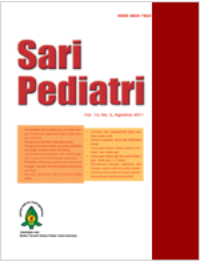Gangguan Tidur pada Anak dengan Epilepsi dan Faktor yang Memengaruhi
Sari
Latar belakang. Gangguan tidur merupakan salah satu komorbid yang sering dijumpai pada anak dengan epilepsi. Sampai saat ini data mengenai hal tersebut masih sangat terbatas.
Tujuan. Mengetahui prevalensi dan faktor yang memengaruhi gangguan tidur pada anak dengan epilepsi.
Metode. Penelitian observasional analitik dengan desain potong lintang pada anak usia 3-18 tahun, yang telah didiagnosis epilepsi minimal 6 bulan. Pasien dengan palsi serebral, diabetes melitus, penyakit jantung, asma, hipertrofi adenotonsil dan anak dengan epilepsi yang telah bebas kejang lebih dari satu tahun dieksklusi dari penelitian. Subyek dipilih secara konsekutif selama periode November 2016 – Maret 2017 di Poliklinik Neurologi Anak RSUP Dr. Sardjito. Gangguan tidur dinilai dengan kuesioner sleep disturbance scale for children (SDSC).
Hasil. Di antara 93 subyek, 63 (67,7%) mengalami gangguan tidur, terbanyak (63,2%) adalah gangguan memulai dan mempertahankan tidur. Tipe kejang umum, onset epilepsi kurang dari 3 tahun, monoterapi dan obat anti epilepsi fenobarbital paling sering mengalami gangguan tidur. Akan tetapi, hanya tipe kejang umum yang berhubungan dengan gangguan tidur (OR 5,2, IK95% 1,35-9,96, p=0,016).
Kesimpulan. Prevalensi gangguan tidur pada anak dengan epilepsi sangat tinggi, terbanyak gangguan memulai dan mempertahankan tidur dan berhubungan dengan tipe kejang umum.
Kata Kunci
Teks Lengkap:
PDFReferensi
Owens J. Classification and epidemiology of childhood sleep disorders. Prim Care Clin Off Pr 2008;2:533–46.
Hysing M, Sy PD, Sivertsen B, Stormark KM, Elgen I, Lundervold AJ. Sleep in children with chronic illness, and the relation to emotional and behavioral problems-a population-based study. J Pediatr Psychol 2009;34:665–70.
Guerrini R. Epilepsy in children. Lancet 2006;367:499-524
Prilipko L, Saxena S, Boer H. Atlas: epilepsy care in the world. Buch 2005;129-91.
Ngugi AK, Bottomley C, Kleinschimdt I, Sander JW, Newton CR. Estimation of the burden of active and life-time epilepsy. J Pediatr Child Health 2010;51:883-90
Wirrell E, Blackman M, Barlow K, Mah J, Hamiwka L. Sleep disturbances in children with epilepsy compared with their nearest-aged siblings. Dev Med Child Neurol 2005;47:754–9.
Yazdi Z, Sadeghniiat-Haghighi K, Naimian S, Zohal MA, Ghaniri M. Prevalence of sleep disorders and their effects on sleep quality in epileptic patients. Basic Clin Neurosci 2013; 4:36–41.
Byars AW, Byars KC, Johnson CS, Ton J, Fastenau PS, Perkins S, dkk. Epilepsy & behavior the relationship between sleep problems and neuropsychological functioning in children with first recognized seizures. Epilepsy Behav 2008;13:607–13.
Al-Biltagi M. Childhood epilepsy and sleep. World J Clin Pediatr 2014;3:45–53.
Becker DA, Fennell EB, Carney PR. Daytime behavior and sleep disturbance in childhood epilepsy. Epilepsy Behav 2004;5:708–15.
Legros B, Bazil CW. Effects of antiepileptic drugs on sleep architecture: a pilot study. Sleep Med 2003;4:51–5.
Carter KA, Hathaway NE, Lettieri CF. Common sleep disorders in children. Am Fam Physician 2014;89:368–77.
Fricke-Oerkermann L, Plück, J, Schredl M., Heinz K, Mitschke A, Wiater A, Lehmkuhl G, 2007. Prevalence and course of sleep problems in childhood. Sleep 2007;30:1371–7.
Natalita C, Sekartini R, Pusponegoro H. Skala gangguan tidur untuk anak (SDSC) sebagai instrumen skrining gangguan tidur pada anak sekolah lanjutan tingkat pertama. Sari Pediatri 2011;12:365–72.
Gutter T, Brouwer OF, de Weerd AW. Subjective sleep disturbances in children with partial epilepsy and their effects on quality of life. Epilepsy Behav 2013;28:481–8.
Van Golde EGA, Gutter T, de Weerd AW. Sleep disturbances in people with epilepsy; prevalence, impact and treatment. Sleep Med Rev 2011;15:357–68.
Cortesi F, Giannotti F, Ottaviano S. Sleep problems and daytime behavior in childhood idiopathic epilepsy. Epilepsia 1999;40:1557–65.
Larson AM, Ryther RCC, Jennesson M, Geffrey AL, Bruno PL, Anagnos CJ, dkk. Impact of pediatric epilepsy on sleep patterns and behaviors in children and parents. Epilepsia 2012; 53:1162–9.
Cortese S, Ivanenko A, Ramtekkar U, Angriman, M. Sleep disorders in children and adolescents. Dalam: IACAPAP e-textbook of child and adolescent mental health. international association for child and adolescent psychiatry and allied professions. Geneva: IACAPAP; 2014.h.1–34.
Batista B, Nunes M. Evaluation of sleep habits in children with epilepsy. Epilepsy Behav 2007;11:60–6.
Placidi F, Scalise A, Marciani MG, Romigi A, Diomedi M, Gigli GL. Effect of antiepileptic drugs on sleep. Clin Neurophysiol 2000;2:115–9.
DOI: http://dx.doi.org/10.14238/sp19.1.2017.7-13
Refbacks
- Saat ini tidak ada refbacks.
##submission.copyrightStatement##
##submission.license.cc.by-nc-sa4.footer##
Email: editorial [at] saripediatri.org


Sari Pediatri diterbitkan oleh Badan Penerbit Ikatan Dokter Anak Indonesia
Ciptaan disebarluaskan di bawah Lisensi Creative Commons Atribusi-NonKomersial-BerbagiSerupa 4.0 Internasional.




